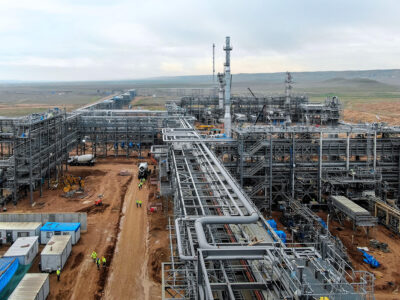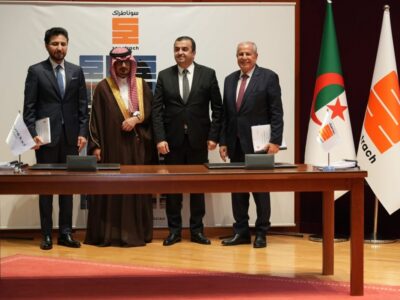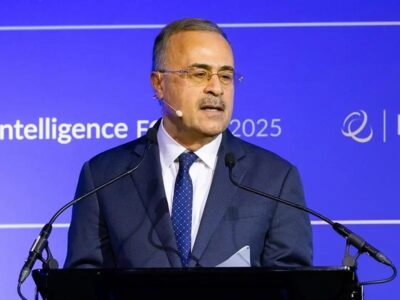Foreign energy firms that win long-term oil development contracts in Iraq must take on an Iraqi partner, Oil Minister Hussain Al-Shahristani said on Monday.Earlier in the day Iraq unveiled six oilfield areas open to foreign firms for long-term development contracts, clearing the way for major international involvement in the country’s petroleum wealth.
Al-Shahristani said an Iraqi partner would need to have a minimum stake of 25 percent in such deals.
“The Iraqi Oil Ministry or its affiliated companies will be a partner in these contracts, holding not less than 25 percent. This is the minimum amount,” Al-Shahristani told a news conference.
He said the deals would be service contracts, not production sharing contracts.
Al-Shahristani also said any foreign firm that wants to bid for long-term oil development contracts must also open an office in Baghdad.
“Competing companies have to establish an office in Baghdad as a way to communicate with the Iraqi Oil Ministry. If the company wins a contract, it has to open an official, registered branch in Baghdad,” Al-Shahristani said.
Few foreign companies have any presence in Iraq because of the security situation.
The opening up of Iraq’s oil sector to international firms, primarily from the US and UK, is likely to anger opponents of the US-led invasion, who have said the 2003 war was designed to control Iraqi oil reserves and serve Western oil companies.
US and British officials have denied the charges.
By allowing international firms to invest and explore its oil fields, the Iraqi government is breaking with the policy of major oil-producing neighbours like Saudi Arabia, Kuwait and the United Arab Emirates whose national firms keep tight control of foreign investment in their oil sectors.
“The six oilfields that have been announced today are the backbone of Iraq’s oil production, and some of them are getting old and production is declining,” Al-Shahristani said.
The fields to be developed are Rumaila, Kirkuk, Zubair, West Qurna Phase 1, Bai Hassan and the Maysan fields. Maysan comprises three fields, Bazargan, Abu Gharab and Fakka.
The Oil Ministry said they are open to foreign firms for long-term development contracts.
It said last week it hopes to sign six short-term oil service contracts during the next month.
Taken together, the short-term and long-term contracts will open the door to major international involvement in the OPEC member’s oil sector for the first time in nearly four decades.
The majors have been positioning for years in the hope of eventually gaining access to Iraq’s proven reserves, which at 115 billion barrels are the world’s largest after Saudi Arabia and Iran.
Deputy Prime Minister Barham Salih said in April that reserves could be as much as 350 billion barrels.
Shahristani announced the list of fields open for long-term contracts at a news conference in Baghdad. The government has already pre-qualified 41 foreign firms to bid for the contracts.
Two gas fields, Akkas and Mansuriyah, were also opened.
“We feel it is very important for Iraq to arrest any decline and increase production,” he said, adding he hoped to sign the deals in June 2009.
The Oil Ministry said last week it had finished negotiations with oil majors on six separate short-term oil service contracts and hoped to sign those deals during the next month.
The short-term deals, each worth about $500 million, are aimed at quickly lifting output at Iraq’s largest producing fields by a combined 500,000 barrels a day. Iraq’s current oil production is around 2.5 million bpd.
Five of the short-term deals that have been under discussion are with Royal Dutch Shell, Shell in partnership with BHP Billiton, BP, Exxon Mobil and Chevron in partnership with Total.
Iraq has also been in talks with a consortium of Anadarko, Vitol and Dome for a sixth short-term contract.
Those talks on the short-term deals have given the majors a head start in efforts to bid for future oil contracts.
In terms of the short-terms contracts, Shell negotiated for the northern Kirkuk oilfield and was also in talks on the Maysan fields, Iraqi officials have said. BP has its eyes on the southern Rumaila field, while Exxon wants the contract for the Zubair oilfield in southern Basra province.
And Chevron and Total were looking to work together to develop West Qurna, also in Basra.
But many Iraqis still bear a grudge after British, American and French oil companies controlled their oil industry for half a century through the Iraq Petroleum Co (IPC).
It was an era when Western majors working in the Middle East used oil output and prices as an economic and political tool, analysts said.
From the time it struck oil at the huge Kirkuk field in 1927 until nationalism forced it out in 1972, IPC – made up of BP, Exxon, Mobil, Shell, CFP (Total) and Partex – ruled the roost.
That did not sit well with Baghdad, which resented IPC’s control over its revenues.
Oil is Iraq’s main source of income, and boosting output is key to earning the cash the country needs for reconstruction.
Iraq’s cabinet agreed a draft oil law in February last year, but it has failed to get through parliament partly because of rows between the Kurdistan Regional Government (KRG) and Baghdad over who will control oil reserves and contracts.
In the absence of the law, Baghdad has moved ahead with the short and long-term contracts, saying this is in line with an old oil law in existence before the US-led invasion in 2003 that toppled Saddam Hussein.







